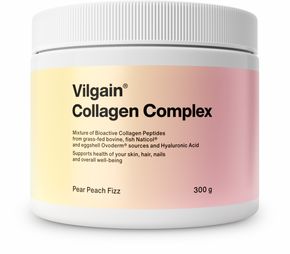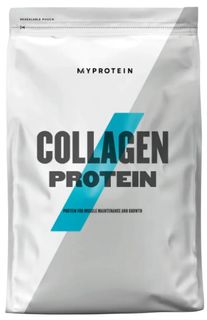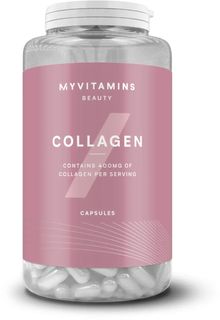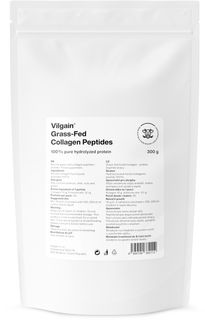
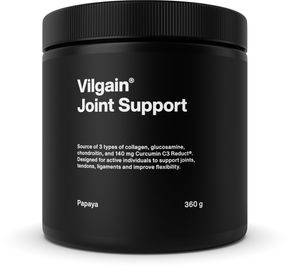
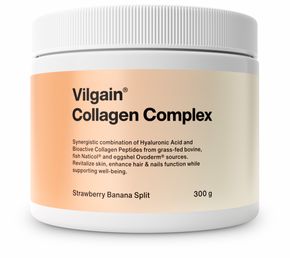
Collagen for skin, joints and hair
Collagen is a water‑insoluble protein that plays an irreplaceable role in the human body. It is the basic building block of bones, joints, tendons, skin, hair and nails, where it provides sufficient strength and elasticity. Between the ages of 20 and 30, the body's natural production of collagen declines, leading to a decrease in skin elasticity, deterioration in the quality of hair and nails, and increased musculoskeletal pain.
The body's collagen stores can be replenished through regular consumption of meat broths, meat, fish, seafood or egg whites. Dietary supplements with collagen are a suitable alternative. Collagen production can also be boosted by taking vitamin C, which is involved in the production of collagen in the body.
How to choose collagen?
There are a number of types of collagens that are important for the human body. Type I collagen, which accounts for 90 % of all collagen in the body and is present in the skin, bones or tendons, can be found in most supplements. Type II collagen, which makes up cartilage, is also important.
Form of collagen
An important criterion in choosing the right dietary supplement is the form of collagen, which differs in the way it is processed and also in its action in the human body:
- hydrolysed collagen is produced by enzymatic cleavage of collagen into a more easily usable form of shorter chains, called collagen peptides. Hydrolysed collagen serves as a building material for some proteins and collagen;
- native collagen is the natural form of collagen found in our bodies. In the human body, it counteracts the biological processes that limit collagen production. This function is used in some joint diseases;
- gelatine is obtained by cooking raw collagen, and as with collagen peptides, it is denatured collagen. Gelatine is used in the preparation of desserts and sweets; due to its low availability, it is not a suitable collagen food supplement.
Collagen by source
Collagen dietary supplements can also be selected based on the source from which they are made. The most common ones are porcine, bovine and marine collagen, which differ in structure and composition:
- Pork and bovine collagen are most commonly derived from pork or beef skin and are less easily absorbed compared to marine collagen due to their higher molecular weight. On the other hand, they contain higher amounts of the amino acid proline, which is involved in the body's production of collagen, which promotes strength. This makes these sources more suitable as joint nutrition supplements.
- Marine collagen, also known as fish collagen, is made from shellfish and the skin and scales of fish. Compared to pork and beef collagen, it is more easily absorbed and contains a higher proportion of type I collagen, making it a suitable beauty supplement.
Use of collagen
To observe positive effects, collagen should be taken for at least 8‑12 weeks. For hydrolysed collagen, a dose of 2500 g per day is recommended, which varies based on the source and purpose of use, so it is always advisable to follow the instructions given. For native collagen, the recommended dose is between 10‑40 mg per day. Unflavoured supplements may have a certain aftertaste which can be 'masked' by adding collagen to tea, coffee, juice or smoothies.
Dietary supplements with collagen can be purchased on their own (most commonly as a powder or capsule) or as part of a complex dietary supplement. So you can try our products as Vilgain Grass‑Fed Collagen Peptides, 100% bovine hydrolyzed collagen, comprehensive joint nutrition Vilgain Joint Support or Vilgain Collagen Complexto support skin, hair and nail health.
